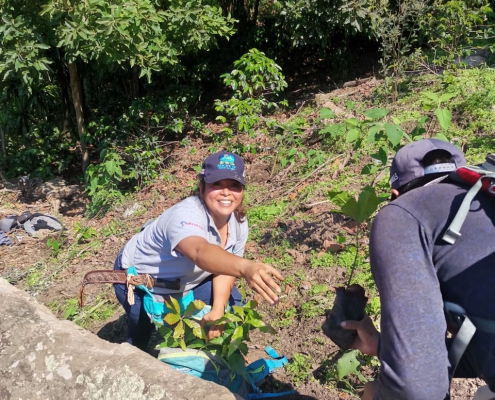Activities 2022
On the other hand, the program for the Establishment of a Water Security Strategy for Guatemala City and the municipalities of the Greater South City Commonwealth (GTM-016-B) is underway, with a grant of 656,000 euro executed by the International Union for Conservation of Nature, and a contribution in kind – valued at 2.2 million euro – from the Municipality of Guatemala City. The objective is to promote a water security strategy for a reliable water supply to the populations of the valley of Guatemala City. To this end, the program is studying the state and degree of exploitation of the aquifer and other sources of resources that supply the populations of the Guatemala City valley and analyzing alternatives. In 2022, Tragsatec technicians who are conducting the study of the aquifer participated in the meeting organized by EMPAGUA, the public water company, with the title 50 years together reaching our greatest flow, in which some of the conclusions of the study conducted, which will be officially presented in 2023, were shared.
Finally, a significant program is underway to improve drinking water and sanitation services in rural and urban areas and support institutional development in the sector (GTM-001-M). This program, executed by the IADB, completed in 2022 the actions to be carried out in the Chixoy area and made considerable progress in the works planned in the municipal capitals of San Marcos. However, there are still pending challenges related to the construction of some supply projects and continuing with the institutional development component of the sector. Completion is expected in October 2023.
COUNTRY CONTEXT

In Guatemala, there are still significant gaps in coverage, especially in rural areas, and only 56% of the total supply meets the necessary drinking water treatment requirements to be considered fit for human consumption. In addition, the incidence of diseases related to lack of safe water in childhood reaches 48.3% (SIGSA 2018), and there are some deficiencies in the governance of the water and sanitation sector, derived from not having a specific law regulating water uses and a weak institutional framework.
The Fund’s objectives in Guatemala are to advance the practical realization of the Human Rights to Water and Sanitation, reduce poverty, and increase the quality of life of its population by improving and expanding access to public drinking water and sanitation services in the country’s neediest areas. The Fund’s actions also aim to reaffirm and strengthen the institutions responsible for water management. The interventions are carried out with an integrated approach to river basins and with a vision of impacts on the health of populations, especially children. Therefore, they include environmental protection, environmental education, sustainability, risk management, health and hygiene training, and a multi-sectoral vision focused on social inclusion, gender equality, and education.
The Cooperation Fund for Water and Sanitation portfolio in Guatemala is one of the most important, both in number and in the Fund’s overall budget, representing a clear commitment of the Spanish Cooperation to the country.

